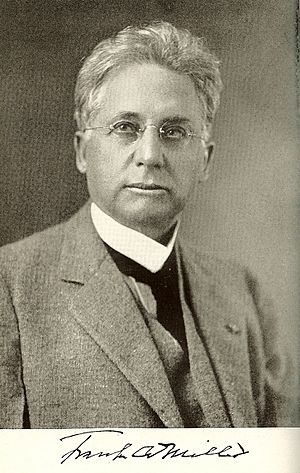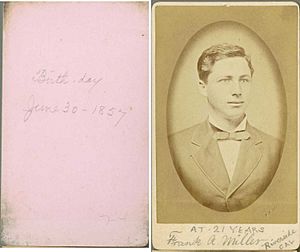Frank Augustus Miller facts for kids
Quick facts for kids
Frank Augustus Miller
|
|
|---|---|
 |
|
| Born | June 30, 1858 |
| Died | June 17, 1935 (aged 76) |
| Resting place | Evergreen Cemetery (Riverside, California) |
| Nationality | American |
| Other names | "Keeper of the Inn" |
| Occupation | Inn keeper |
| Known for | Civic leader and builder of the Mission Inn. |
Frank Augustus Miller (born June 30, 1858 – died June 17, 1935) was a very important person in Riverside, California. He owned and greatly expanded the famous Mission Inn. A local school, Frank Augustus Miller Middle School, is named after him. He was also a strong leader and helped promote Riverside.
Contents
Frank Miller's Early Life
Frank Miller was born in Tomah, Wisconsin in 1858. His parents were Christopher Columbus Miller and Maryanne Miller. Frank was one of four children in the family.
Moving to Riverside
In 1874, Frank's family moved to Riverside. His father, Christopher, was a surveyor and civil engineer. He helped a lot with building up the city of Riverside. Christopher bought a piece of land in downtown Riverside.
The First Inn
The Miller family built a home on their new land. The first floor was made of adobe bricks. The second floor was built with wood. They didn't like how the adobe looked. So, they covered it with wooden siding. This large house had 12 rooms. It was planned as a family home. But it also had extra rooms for visitors. At that time, there were no hotels in Riverside.
The Mission Inn Story
Frank Miller's parents wanted him to go to college. But Frank really wanted to stay in Riverside. He wanted to run the family's boarding house. His parents agreed to let him stay.
Frank and Isabella
Frank's mother arranged for a teacher, Isabella Hardenberg, to tutor him. Isabella was already staying at their inn. Frank and Isabella became good friends. They got married in 1880. Frank's father didn't enjoy running the boarding house. So, he sold it to Frank for $5,000.
Expanding the Inn
Frank Miller had big plans for the inn. He wanted to make it much larger. He worked with architects to add new parts to the building.
- The Mission Wing: In 1902, Frank and architect Arthur Benton built the "Mission Wing." This part had 84 new rooms. It was built in the 'Mission Revival' style. Frank got $250,000 from his friend, Henry E. Huntington, to help pay for it.
- The Cloister Wing: In 1911, the Cloister Wing was added. Arthur Benton also designed this part.
- The Spanish Wing: The Spanish Wing was finished in 1914. The first three floors were designed by Myron Hunt. He also designed the Rose Bowl stadium.
- The Rotunda Wing: The Rotunda Wing was completed in 1931. G Stanley Wilson was the architect for this section.
Frank Miller's Impact on Riverside
Frank Miller was more than just an inn owner. He was a true leader in Riverside. He helped the city grow in many ways.
- Trolley Service: He started a trolley service. It ran from the Mission Inn to Arlington.
- Grocery Store: He opened a grocery store called the "Blue Front Grocery." It was named for its bright blue paint.
- Opera House: Frank managed the Loring Opera House. This theater had 1,000 seats. He even arranged for the entertainers to perform there.
- Sherman School: He helped move a Native American Indian School. It moved from Perris to Riverside. It was named the "Sherman School."
- Easter Sunrise Service: In 1909, he started the Mount Rubidoux Easter Sunrise Service. This event still happens every Easter.
- Riverside County: Frank was a founding member of Riverside County, California. This new county was formed from parts of San Diego and San Bernardino Counties.
- March Field: He helped the government choose a spot for a military airfield. This airfield, March Field, is now called March Air Reserve Base.
- Citrus Testing Station: Frank helped create a Citrus Testing Station. This station helped orange growers protect their crops. It later became the University of California, Riverside, or UCR.
Legacy
Frank Augustus Miller passed away on June 17, 1935. He is buried in Riverside's Evergreen Cemetery. His work helped shape Riverside into the city it is today.
Images for kids
 | Calvin Brent |
 | Walter T. Bailey |
 | Martha Cassell Thompson |
 | Alberta Jeannette Cassell |



